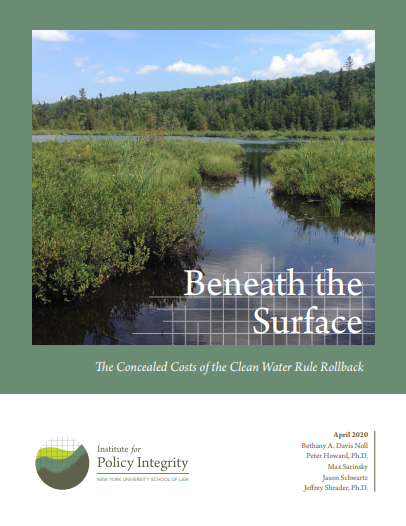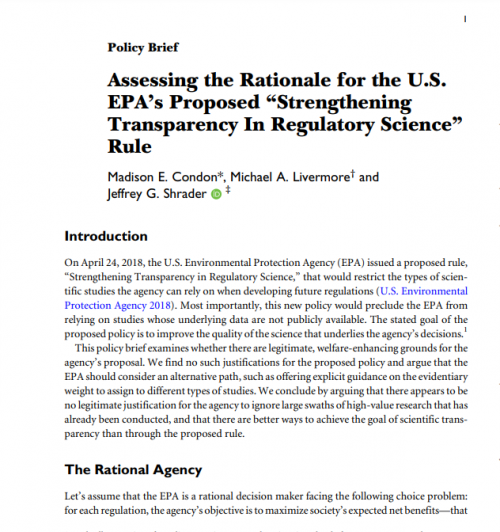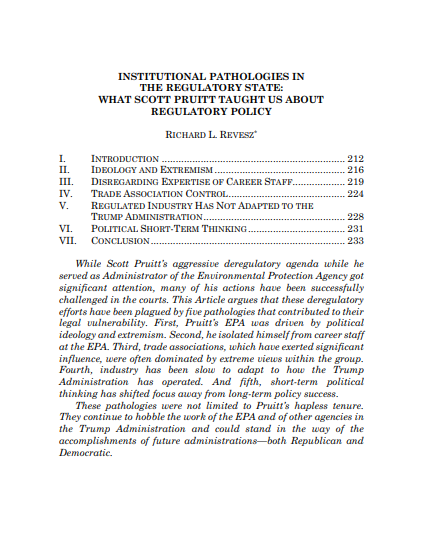-
Beneath the Surface
The Concealed Costs of the Clean Water Rule Rollback
In restricting the scope of the Clean Water Act through two regulatory rollbacks, the Environmental Protection Agency and Army Corps of Engineers claim that the estimated compliance-cost savings exceed the environmental harms (in the form of forgone benefits). Yet these analyses suffer from severe methodological flaws. And correcting the analyses would very likely show that the rollbacks are net costly to society, depriving the public of potentially billions of dollars in annual forgone benefits. As detailed in this report, the agencies’ failure to meaningfully assess the substantial harms that will result from their rollbacks violates both regulatory precedent and the agencies’ legal obligations.
-
New Resource Tracking Reduced Enforcement of Environmental Laws in Response to COVID-19
The Institute for Policy Integrity is tracking altered enforcement of environmental laws by federal and state agencies in response to the COVID-19 pandemic. In connection with the crisis, several agencies have issued waivers or announced plans to stop enforcing key environmental laws and regulations.
-
Key Economic Errors in the Clean Car Standards Rollback
The federal Clean Car Standards promised steadily increasing fuel efficiency and lower vehicle emissions. The National Highway Traffic Safety Administration and the Environmental Protection Agency have now rolled back those standards, eviscerating important public health benefits and fuel savings for consumers. But the agencies’ own analysis shows that the rollback will cause more harm than good for society. And even the slight benefits that the agencies find under certain assumptions are premised on a flawed economic analysis that is riddled with problems.
We released a resource that explains the main economic problems with the rollback’s justification, identifying several critical errors and detailing how they invalidate the agencies' own claims
-
Comments to OMB on Marginal Excess Tax Burden
The Office of Management and Budget (OMB) requested input on the possibility of including an estimate of the social cost of taxation, known as marginal excess tax burden (METB), in regulatory-cost accounting for transfer rules under Executive Order 13,771. We submitted comments responding to OMB claims and providing further information about METB.
-
Comments on OMB Reports to Congress
The Office of Management and Budget (OMB) issues yearly reports on the benefits and costs of federal regulations. We submitted comments on its draft 2018, 2019, and 2020 reports, explaining how OMB can better provide policymakers and the public with essential information.
-
Comments to SEC on Shareholder Proposal Regulations
The Securities and Exchange Commission (SEC) proposed a rule that would limit investors’ ability to propose shareholder resolutions for a vote by fellow shareholders. The rule would raise requirements on the amount of stock required to be owned, impose requirements for the length of time the stock must have been held, and make it harder to resubmit resolutions that had failed to reach majority support in prior years. We submitted comments critiquing the rule, which will limit shareholder monitoring and likely have an outsized impact on shareholders’ role in environmental oversight.
-
Comments to EPA’s Chartered Science Advisory Board
We submitted four comments in advance of the Environmental Protection Agency’s (EPA) January 2020 meeting of its Chartered Science Advisory Board (SAB).
-
Assessing the Rationale for the EPA’s Proposed Regulatory Science Rule
The U.S. Environmental Protection Agency (EPA) is considering a new policy that would prohibit the agency from issuing regulations that rely on studies whose underlying data are not publicly available. While the EPA claims it is pursuing this policy in the interest of transparency, we argue that such a prohibition would greatly hinder, rather than help, the rulemaking process and would likely result in undesirable regulatory outcomes that fail to maximize economic welfare.
-
Comments to EPA on Coal Combustion Residuals Rule
The Environmental Protection Agency (EPA) recently proposed to significantly weaken requirements for the disposal of coal combustion residuals from coal-fired power plants. We submitted comments focusing on inadequacies in EPA’s assessment of the rule’s costs and benefits.
-
Institutional Pathologies in the Regulatory State
What Scott Pruitt Taught Us About Regulatory Policy
While Scott Pruitt’s aggressive deregulatory agenda while he served as Administrator of the Environmental Protection Agency got significant attention, many of his actions have been successfully challenged in the courts. This Article, published in the Journal of Land Use & Environmental Law, argues that these deregulatory efforts have been plagued by five pathologies that contributed to their legal vulnerability.
Viewing recent projects in Government Transparency










